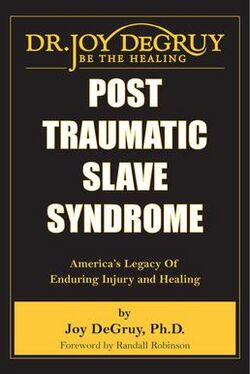Medicine:Post Traumatic Slave Syndrome
 | |
| Author | Joy DeGruy Leary |
|---|---|
| Country | United States |
| Subject | Transgenerational trauma, Racial inequality in the United States, Racism in the United States |
| Genre | Sociology / Race Relations |
| Published | 2005 |
| Publisher | Uptone Press |
| Pages | 235 pages |
| ISBN | ISBN:0-9634011-2-2 |
| Website | https://www.joydegruy.com/ |
Post Traumatic Slave Syndrome: America's Legacy of Enduring Injury and Healing is a 2005 theoretical work by Joy DeGruy Leary.[1] The book argues that the experience of slavery in the United States and the continued discrimination and oppression endured by African Americans creates intergenerational psychological trauma, leading to a psychological and behavioral syndrome common among present-day African Americans, manifesting as a lack of self-esteem, persistent feelings of anger, and internalized racist beliefs. The book was first published by Uptone Press in Milwaukie, Oregon in 2005, with a later re-release by the author in 2017.
Post Traumatic Slave Syndrome
Expanding on a hypothesis of "post-traumatic slavery syndrome" by psychiatrist Alvin Francis Poussaint and journalist Amy L. Alexander, DeGruy wrote in her 2001 doctoral thesis that African Americans "sustained traumatic injury as a direct result of slavery and continue to be injured by traumas caused by the larger society's policies of inequality, racism, and oppression."[2]:91–92 This is summed up in Post Traumatic Slave Syndrome as:
Multigenerational trauma together with continued oppression and [a]bsence of opportunity to access the benefits available in the society.[2]:118
In the book, DeGruy argues that PTSS is a result of unresolved post-traumatic stress disorder arising from the experience of slavery, transmitted across generations down to the present day, along with the stress of contemporary racial prejudice (e.g. via racial microaggressions). This manifests as a psychological, spiritual, emotional, and behavioral syndrome that results in a lack of self-esteem, persistent feelings of anger, and internalized racist beliefs.[2]:117–118
DeGruy states that PTSS is not a disorder that can simply be treated and remedied clinically but rather requires profound social change in individuals, as well as in institutions, that continue to reify inequality and injustice toward the descendants of enslaved Africans.[citation needed]
The theory has been generative of subsequent academic work in clinical psychology and black studies.[2][3][third-party source needed]
Reception
In addition to forming the basis of public lectures and workshops offered by DeGruy and her contemporaries, the research described in Post Traumatic Slave Syndrome inspired an eponymous play, which was staged at the Henry Street Settlement Experimental Theater, New York, in 2001.[4]
See also
- Historical trauma
- Sociology of race and ethnic relations
- Weathering hypothesis
References
- ↑ Hammond, Pamela V.; Davis, Bertha L. (2007). "Post Traumatic Slave Syndrome". ABNF Journal 18 (4): 112. OCLC 1132167120.
- ↑ 2.0 2.1 2.2 2.3 Cite error: Invalid
<ref>tag; no text was provided for refs namedHicks - ↑ Halloran, Michael J. (2019). "African American Health and Posttraumatic Slave Syndrome: A Terror Management Theory Account". Journal of Black Studies 50 (1): 45–65. doi:10.1177/0021934718803737. ISSN 0021-9347.
- ↑ Gates, Anita (2001-09-14). "THEATER REVIEW; Foraging in the Mind, Where Slavery's Scars Linger". The New York Times. ISSN 0362-4331. https://www.nytimes.com/2001/09/14/movies/theater-review-foraging-in-the-mind-where-slavery-s-scars-linger.html.
 |

